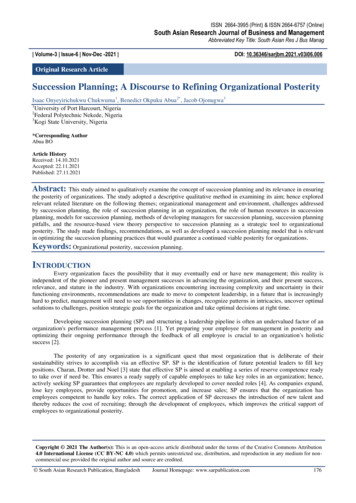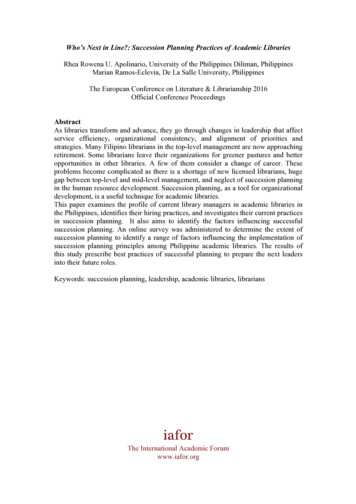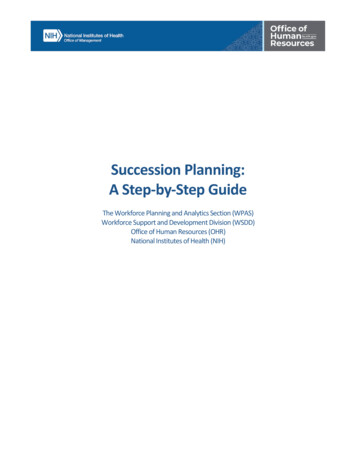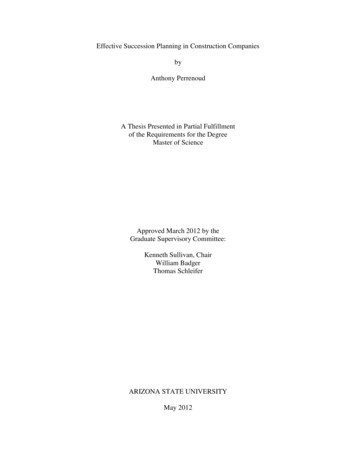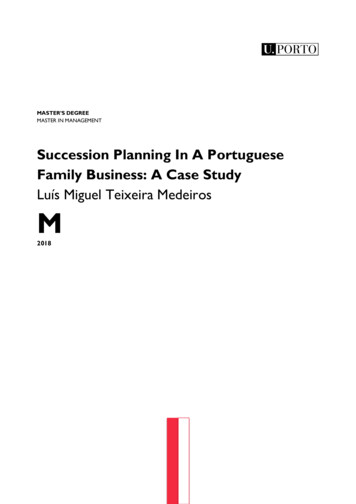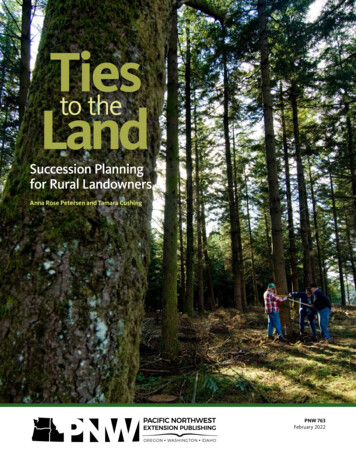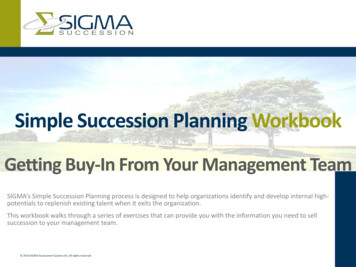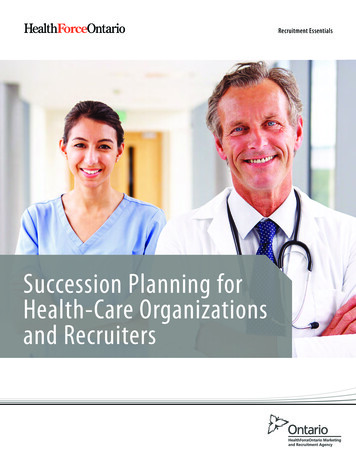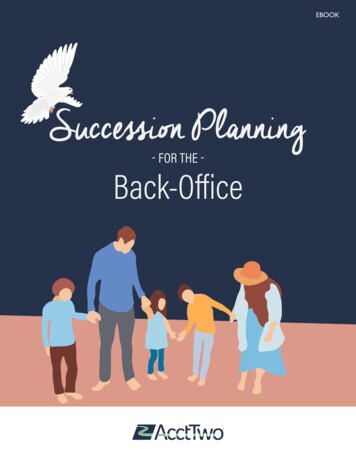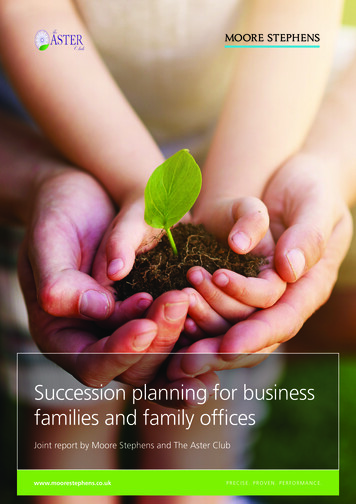
Transcription
Succession planning for businessfamilies and family officesJoint report by Moore Stephens and The Aster Clubwww.moorestephens.co.ukPRECISE. PROVEN. PERFORMANCE.Succession planning for business families and family offices
Family officesIntroductionSuccession planning is a vital activity for business families and family offices. It supports the widespreadgoals of preserving family wealth, benefiting charitable causes and having a positive social impact. Yet,as our survey has found, too few family offices have put succession plans in place.We conducted a survey of the family office community, seekingtheir views on a range of issues related to succession planning.The survey found high awareness of the importance of making asuccession plan, but a widespread failure to act. This is a concern,because of the time it takes to form and implement a strategy toensure the smooth transition of decision-making responsibility tothe next generation. For example, family decision makers recognisethat their successors need certain qualities, such as leadership skills.Ensuring the chosen successors develop such capabilities requiresplanning ahead.Family members may not be fully aware of some of the potentialroad bumps they could encounter as a result of weak planning,governance and operating procedures.This report aims to encourage discussion of such issues withinfamilies and family offices – and to increase the potential for familiesto preserve their wealth and pass it on to future generationsefficiently and effectively.Who we surveyedWe invited responses from the family office community, including family members, family office executives and advisers to familyoffices. Participants came from all groups, and with an international focus, including the US, Canada, Switzerland, UK and SaudiArabia, together with a range of other locations in mainland Europe, South America, Asia and Australasia.1Succession planning for business families and family offices
Family officesSurvey findings“ Respondents reporting the lack of any succession plan identifieda number of barriers to succession and development planning“Succession planning is important – but barriers get in the way88% of respondents think that a succession plan is extremely important forfamilies. Despite this, 38% of respondents say no succession plan is currentlyin place.Respondents reporting the lack of any succession plan identified a number of88%think a succession planis extremely or veryimportant88%barriers to succession and development planning. Topping the list is the factthat the decision maker may not be ready to hand over authority: 31% ofrespondents where no succession plan exists see this as a barrier.Other significant barriers to succession planning include difficulties withreaching agreement and decision making, identified by 22% of respondentswithout a succession plan. 21% of respondents identified the lack of a clearapproach as a barrier, 19% say timing is an issue. Only 8% indicated that31%not ready to handover authority31%budgetary issues created a barrier.Succession planning is a sensitive matter. Consider a scenario where thedecision maker is the entrepreneur who built up the family’s business andwealth. This individual is highly successful and used to making decisions. Theconcept of handing over the reins to the next generation may be difficult oruncomfortable. However, it is important to prepare for the future and makeplans for how the transfer of responsibility to successors will be handled.38%have no succession plancurrently in placeSuccession planning is, after all, about planning: it does not represent animmediate handover of power or authority. It involves looking ahead to adesired goal – in particular, the successful continuation of the family’s wealth.Succession planning for business families and family offices2
Family offices“ The desire to have a social impact and to benefit othersbeyond the family realm is a characteristic of many families,and perhaps particularly of younger generations seeking tomake their mark in new ways“Succession planning is intended to preservefamily wealththe family realm is a characteristic of many families, and perhapsFor 28% of respondents where a succession plan is in place,new ways. Succession planning is therefore important to ensure thatthe objective behind it is to preserve wealth for family members.necessary structures, processes and resources are established so thatThis is the most widespread objective identified in the survey.families can achieve their goals fully and have maximum impact.Other important objectives of succession planning include:Successors require a range of qualities continuing the family business, identified by 20% of respondents28% of respondents with a succession plan see leadership as awith a succession plan in place;particularly of younger generations seeking to make their mark inquality that successors should posses. Other important qualities securing the future success of family members (19%);include business experience (20%), education (18%) and technical building a personal or family legacy (17%) and creating socialknowledge (15%). And 14% think that successors need to have aimpact (16%).certain position within the family.Families are taking steps to prepare successors for the future. 32%41%say immediate familymembers are thebeneficiaries20%say their extendedfamily members willbenefitof respondents with a succession plan in place say successors arebeing involved in the family business, family office or family council,while 30% are using coaching and mentoring to help successorsdevelop the skills and qualities they need. A fifth say the successorsare gaining more education in the relevant field, while 18% arepreparing successors through on-the-job training.21%say charitablefoundation will be theirbeneficiaries18%say non-familymembers will be theirbeneficiariesIt is vital that today’s decision makers within families allow sufficienttime for their successors to develop the skills and gain the experiencethey will need. For this reason, succession planning should beundertaken at least three to seven years before any transfer ofresponsibilities is desired. Education needs to be balanced withvaluable real-life experience. It is also important to ensure that,when intended successors are involved in the family business, theyare given the opportunity to gain real experience and objectiveFamily members are, not surprisingly, the main beneficiaries offeedback and to learn from their mistakes. Senior family memberssuccession plans. Among respondents reporting a succession plan toshould consider: is it ever possible for a son or daughter to bebe in place, 41% say immediate family members are the beneficiariestreated like any other employee? Even where non-family membersand 20% say extended family members will benefit. However, 21%are encouraged to do so, they can find this hard to achieve in reality.indicate that charitable foundations are beneficiaries of the successionFor this reason, gaining experience outside the family firm canplan and 18% say that non-family-member executives stand to gain.sometimes be particularly powerful.The desire to have a social impact and to benefit others beyond3Succession planning for business families and family offices
Family offices“ Establishing formal family values is without questiona wise exercise for wealthy families. These valuesrepresent the guiding principles that will inform allfamily activities and decision“Too few families have formalised family values and governanceA third of survey participants have formalised family values (33%), whileanother 45% say values are being considered. Around a fifth (22%) sayvalues are not required.45%said values are beingconsidered45%Respondents who do have formalised family values identify many benefits.The respondents with formalised family values say these help them to bindthe family together (40%) and 34% say family values provide guidance onissues. In addition, 26% believe their formalised family values help them tomake key decisions.Establishing formal family values is without question a wise exercise forwealthy families. These values represent the guiding principles that willinform all family activities and decisions. They provide a sense of stability33%said they have formalisedfamily values33%even during unstable or fast-moving times.Less than a third (29%) of all respondents have a family constitution,governance or family employment rules in place. Some families may questionthe need for such arrangements on the grounds that they are not corporationsor governments, but are naturally tied together by family relationships.However, establishing a family constitution and governance procedures canhelp to ensure there is shared understanding of how the family seeks to22%said that values arenot requiredoperate and that decisions will be taken in an appropriate manner, for thebenefit of the family. This can help to avoid unnecessary disagreement anddisharmony – particularly as the family increases in size, for example. Familyemployment rules are useful: they specify the competencies required of familyemployees and ensure a clear distinction is maintained between managementand ownership rights. Family members may have ownership rights andresponsibilities, but those should be distinct from management rights. The twocan become blurred in the absence of clear ground rules. Family employmentrules (and governance procedures) need to be kept up to date to reflect thechanging expectations of family members or of society at large.Succession planning for business families and family offices4
Family officesFamily offices“ The most popular issues currently discussed at meetings withfamily members are forward-looking investment strategies,discussed by 25% of those holding meetings, and historicalreviews of financial information“Topics at meetingsDefined operating processes and objective boardmembers add valueFamilies are most likely to have defined processes for financial18%discuss succession planning,family tax positions andlegal issues10%activities (34% of all respondents) and decision making (28%).discuss hot topics suchas cyber security or theCRS and the FATCAperformance of individuals and the organisation (18%) and forHowever, relatively few have defined processes for managing thepeople development (16%). Given the importance of peopledevelopment, particularly the development of successors, definedprocesses would be beneficial.Meetings could be more regular and strategicAs noted, 28% have defined processes for decision making. However,Less than half (48%) of all respondents have regular meetings with61% of all respondents say decision making on strategic issues isfamily members, although another 45% have meetings ‘whenguided by a strong leader who makes decisions on behalf of therequired’, while 7% never have regular meetings. Scheduling regularfamily. In only a third of cases are decisions based on consensus, whilemeetings is recommended: from a practical perspective, regularity10% of respondents say decision making is based on a majority vote.increases the likelihood of full attendance. More strategically,These findings reflect the strong control that many senior familyconvening ad hoc meetings ‘when required’ is a reactive way tomembers – particularly the original entrepreneur behind the family’smanage family affairs, whereas holding regular meetings encourageswealth – have on decision making. It may be helpful to reviewa more proactive approach. Family members are more likely to discusswhether processes in place for decision making are operating as theymore general, strategic issues in regular meetings. The result is thatshould and whether any greater time spent on building consensusthe family is better prepared for the future.would benefit the family as a whole.The most popular issues currently discussed at meetings with familyA majority (64%) of all respondents have non-family members atmembers are forward-looking investment strategies (discussed byboard level. In general, introducing non-family members to the board25% of those holding meetings) and historical reviews of financialis beneficial. Such individuals can bring particular expertise andinformation (23%). Succession planning is only discussed by 18%,experience, as well as an objective viewpoint unaffected by familyas are family tax positions and other legal issues. Only 10% discussrelationships and emotional responses. However, the objectivity of anhot topics such as cyber security or the Common Reportingindividual should not be assumed purely on the basis that they areStandard (CRS) and the US Foreign Account Tax Compliance Actnot a family member. The closest confidant of the key decision maker(FATCA), both of which increase global tax transparency by enablingis unlikely to provide an objective voice, for example.jurisdictions to share financial information on individuals. The omissionof these topics from the agenda at many families’ meetings is aconcern as such issues could affect many families and their wealthpreservation strategies.5Succession planning for business families and family offices
Family officesConclusion: time to prioritisesuccession planningSuccession planning is a vital activity that all family offices should undertake – but one they often finddifficult to achieve successfully. It is, as this report has identified, a sensitive activity.Families by their very nature contain a web of relationships –between different generations and different members of eachgeneration, and with external parties such as confidants and keyadvisers. These relationships are shaped by shared experiences andsometimes differing emotional responses to events. Objectivedecision making can therefore be difficult. As individuals we maythink we are behaving in a certain way, when what we are actuallydoing and the impact of our actions is very different. It is thereforeimportant to make time to reflect on whether what we think to bethe case really is the case.Perceptions of the status quo can also differ between members.The entrepreneur who built the family wealth may fail tounderstand the frustrations of a son or daughter wanting to maketheir own impression on the family business or other family activities,but denied the freedom to make decisions, and learn from mistakes.Junior family members may believe their high level of educationqualifies them for more responsibility than they can yet handle.Extended family members with ownership rights may expectmore influence over management issues than is rightly theirs.Assumptions can too easily be made about the family’s goals andvalues, without clear discussions and any consensus.Many of these issues can be challenging to address by familymembers alone. Sometimes building mutual understanding and“ Only through careful planning can keygoals such as preserving family wealthbe achieved. By establishing agreed familyvalues, governance procedures and vitalprocesses can the foundations for a securefuture be built.”agreement requires the input of an objective external adviser, onewho can see the viewpoints of different family members while alsokeeping the family’s best interests at the heart of discussions.Only through careful planning can key goals such as preservingfamily wealth be achieved. By establishing agreed family values,governance procedures and vital processes can the foundations fora secure future be built. Only by looking ahead can senior membersand key decision makers ensure that their successors have the timeand space to develop the qualities they need to be able to step upto senior roles themselves.Succession planning for business families and family offices6
Family officesEngaging the next generationEveryone benefits from exercise regardless of age or physical ability. Despite knowing it is a vital activity,many struggle with the motivation to start. This is where the knowledge and action gap lies. We often havethe knowledge to choose the right path. But we need to be aware of the ‘how’.The gap between knowledge and actionshared to whom? How? How often? Who makes decisions andThe succession planning survey clearly revealed the gap betweenwhat benefits are distributed to whom. People aspect of successionknowing and doing. 88% of respondents surveyed understandplanning includes enhancing existing leadership, managingthat succession planning is important. Yet, 38% do not have aleadership transition and developing future leaders.plan in place.31% of those without a plan said that the family’s current decisionCHOOSEmaker was not ready to hand over authority. The decision maker isStructureoften the individual who has built up the family’s wealth, or hasthat supports peoplebeen responsible for it for a number of decades. As a result, thedecision maker may be reluctant to hand over control of what mayDEFINEbe a lifetime’s work.ProcessThe knowledge and action gap can be contributed to three factors:UNDERSTANDnot knowing how, not having strong motivators or not havingPeoplerobust incentives.How to start a succession planSuccession planning has three dimensions: structure, process andMotivators for succession planningpeople. To start with the people element is most straightforward,This is the critical success factor for succession planning. Whatfollowed by process and structure. It is easy to fit a structure aroundmotivates a current decision maker to look for a successor? Andpeople but difficult to find the right people for the structure. Thewhat motivates other members of the organisation to support thekind of people will define the processes and the structure that fits.transition? Any succession planning that lacks strong motivators isCompetent and ambitious individuals often prefer a flexible processnot likely to succeed in the long term, nor successfully sustainand structure so that they can fully apply their knowledge andthroughout the generations.experience. Less experienced individuals may require a predefinedprocess and solid structure to support them. The number of peopleSome leaders are willing to hand over the business to a successor.will also affect process and structure, smaller more flexible andHowever, the person in line may not be ready or there can be a lacklarger, more rigid.of someone suited to the position. Most of the time though, there isno lack of successor candidates. However, the leader may not haveThe succession planning structure includes legal structures such asa strong motivator to move on, as they have not yet found somethingtrusts, foundations, and corporations. This could include familyelse to keep them engaged and active. Finding strong motivators foroffice, and operational structures such as the family council,a current leader to make a transition is the first step. Once theinvestment policy, family governance, etc. Succession planningmotivation is in place, finding and developing a successor is a fairlyprocess includes communication protocol: What information issmooth process.7Succession planning for business families and family offices
Family offices“ Succession planning is an ongoing and evolving processwhich takes long-term commitment. When somethingchanges in a structure, that triggers a change inprocesses which affect people“Separately, for the successor, one big hesitation can be operating inthe shadow of a previous leader. To counter this, a strong motivator isthe opportunity for the person in line to make their own mark whilerespecting the previous leader’s achievement. Managing a transitionfrom one leadership to another is always challenging as it involves agroup of people who may have conflicting motivators. This is wherehaving an objective advisor is helpful to manage any sensitivepositions. Introducing an advisor to support succession planning canfacilitate the process, provide objectivity, broaden perspectives andpotentially diffuse any internal differences of opinions.Incentives for succession planningSuccession planning is an ongoing and evolving process whichtakes long-term commitment. To manage this dynamic projecteffectively, it is appropriate to have incentives at every benchmark.The incentive should be meaningful enough to motivate individualsto continue to support the succession planning process, even if it isgradual. Each family and organisation is different, and an in-depthunderstanding of the members and organisation is required to comeup with constructive incentives. These can be both tangible andintangible. Often, recognition, status or social aspects are morehighly sought after incentives than any financial gain.Despite the many challenges involved, considering the family’slong-term motivators, incentives, objectives and capturing these ina succession plan should be an essential part of strategic planningfor all wealthy families and family offices.“ Each family and organisation is different,and an in-depth understanding of themembers and organisation is required tocome up with constructive incentives.”Succession planning for business families and family offices8
Family officesMoore StephensMoore Stephens helps family offices and their principals thrive in aMoore Stephens International Limited is a global accountancy andchanging world. We have the experience and expertise coupled withconsulting network, headquartered in London. Our business is builtan international outlook.around helping businesses thrive as their circumstances change. Inorder to help you expand across the markets you have identified asWe understand that balancing family and business interests is notareas of growth, we will coordinate advice from a global network ofalways easy, especially as one can impact significantly on the other.offices in more than 100 countries.We act for many clients through several generations and help themadapt their structures to suit their personal circumstances and theClients have access to a range of core and specialist serviceschanging environment.including audit and assurance, tax compliance and advisory,wealth management, private client consultancy, corporate finance,Our family office team provides a range of services, from financialmanagement consultancy, restructuring and insolvency, forensicand tax advisory through to assurance, regulatory consultancy andaccounting, business support and outsourcing.compliance, aimed at both individuals and family structures andfunds. Our aim is to help our clients structure and protect theirwealth effectively.The Aster ClubThe Aster Club is a private membership club for multi-generationentrepreneurial skills while building strong relationships with peersmembers of business families. Its members are active business ownerswho are going through the same transformation. All of our globalwith keen interests in connecting with global families, growing themeetings include sessions about succession planning. Founders andbusiness, sustaining wealth, and preserving family legacy. To date, thecurrent family business leaders enjoy hearing the succession planningClub has more than 50 families in its community representing moreexperiences of different families. They discuss lessons learned andthan 30 industries from six global regions.best practices that can be applied to their own family.We support business families in every step of the succession planningThe Aster Club facilitates activities to help business families to growprocess ensuring that the people, process and structure aspects of theand sustain their business and wealth. Our members use our businessbusiness are ready for unexpected or planned changes in the familymatchmaking services when they want to expand their business,business. Our succession planning experts have strong experience incollaborate with other families and enter new markets and regions.supporting business families to draw up a viable succession plan.The families have access to our curated business and directOur development programs for future leaders such as Assessmentinvestment opportunities from The Aster Club members, and other& Development Program, Young Leaders Program and Future Leadersexclusive sources including reciprocal clubs.Meetings help future successors to develop leadership and9Succession planning for business families and family offices
Succession planning for business families and family offices10
Moore Stephens LLP, 150 Aldersgate Street, London EC1A 4ABT 44 (0)20 7334 9191www.moorestephens.co.ukDPS39631Succession planning for business families and family offices
1 Succession planning for business families and family offices Introduction We conducted a survey of the family office community, seeking their views on a range of issues related to succession planning. The survey found high awareness of the importance of making a succession plan, but a widespread failure to act. This is a concern,
